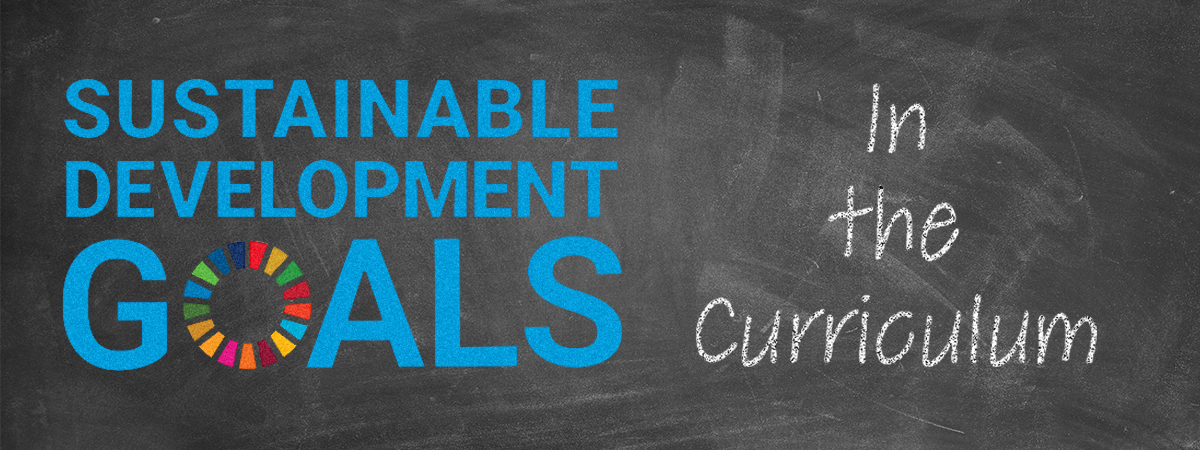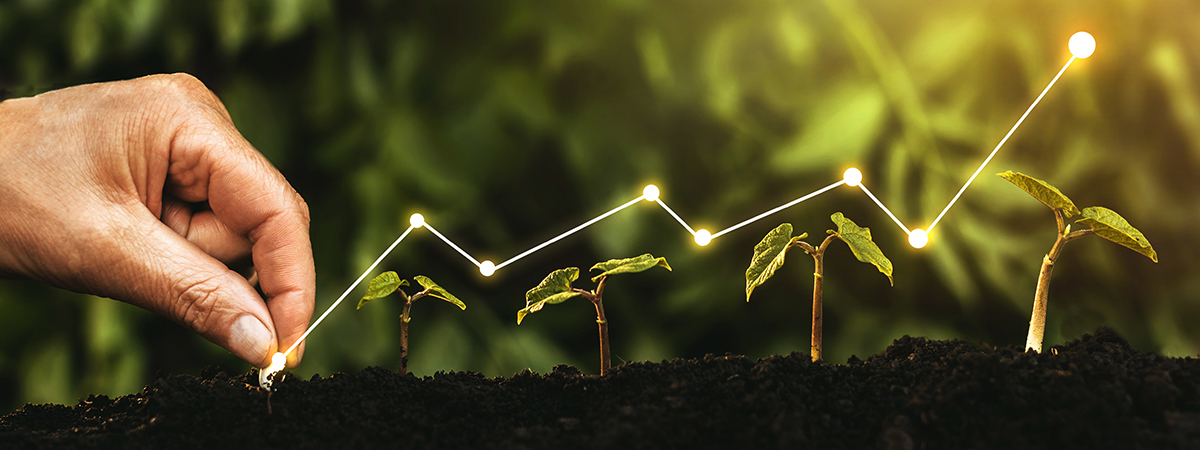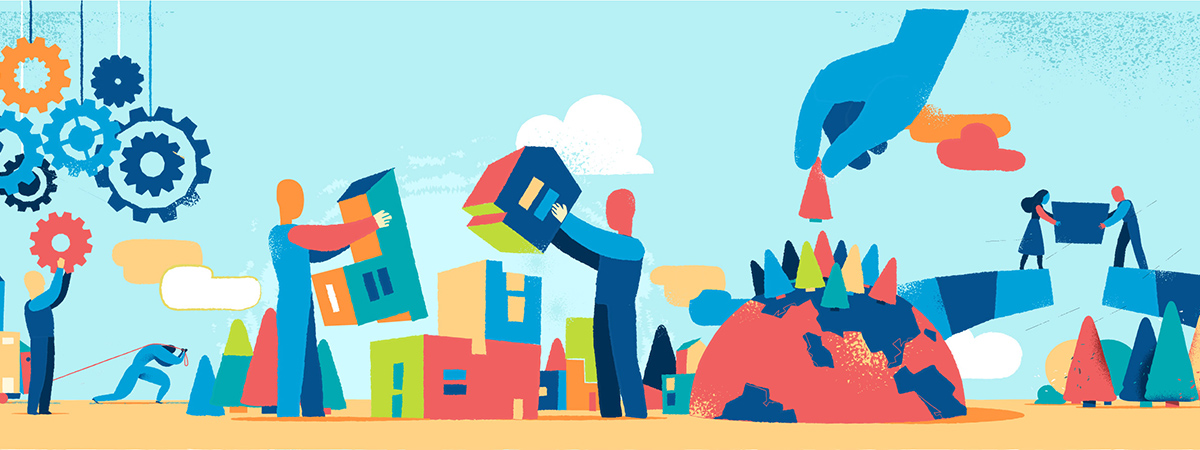
Editor’s note: This is the fourth in a series of stories exploring sustainable development work in the Ivan Allen College of Liberal Arts.
By Ian Frazer
The way Assistant Professor Todd Michney sees it, many depictions of American history are missing something. The environment, and our impact on it, only started to become a significant theme in American history around the 1960s. That is when the environmental movement gained steam thanks to works such as Rachel Carson’s Silent Spring.
But, of course, those impacts started decades before. What about the agriculturalization of the South, including the widespread cultivation of cotton, which is particularly taxing on the land? What about the very start of American society, when trees on what had been Native American land were marked for building ships for the Royal Navy?
This change in frame and perspective is the thrust behind Michney’s course HTS 3005 — American Environmental History.
“It’s a way to rethink American history by bringing the environment in,” said Michney, who teaches in the School of History and Sociology.
Michney’s course is one of many across the Ivan Allen College in which students encounter sustainable development and, specifically, the United Nations Sustainable Development Goals. President Ángel Cabrera called on Georgia Tech to support the SDGs as part of our new strategic plan and mission to develop leaders who advance technology and improve the human condition.
As someone who is interested in sustainability, where we consider problems from environmental, economic, and social perspectives, this class has helped me more explicitly make connections among them.
– Carolyn Burch, student, Master of Sustainable Energy and Environmental Management
By bringing the SDGs into the classroom, Ivan Allen College faculty members help students see how sustainability concepts apply to diverse fields and give them the tools to apply those concepts to their fields of study, said Carol Colatrella, associate dean for graduate studies and faculty development.
“Including the sustainable development goals in the classroom is an excellent way to encourage students to think about the implications of their intended careers on the future of our planet and all who depend on it. It helps develop their global competencies and their ability to become global leaders,” said Colatrella, who, as a professor in the School of Literature, Media, and Communication, incorporates the SDGs in her gender courses and her class on biomedicine and culture.
Using the environment as a new way to see the past
Michney, who focuses much of his research on American urban history and has helped create a digital archive of former Atlanta Mayor Ivan Allen Jr.’s records, first created the concept for HTS 3005 when he was teaching at Tulane University from 2006 to 2009. The course is as comprehensive in focus as many surveys of American history, which Michney said surprises some students who expect it to just focus on the environmental movement.
That is a significant part of the class, but so are events such as the initial settlement of New England, the expansion westward from Chicago and its accompanying environmental changes, and the effects of urbanization on the surrounding environment.
And one of the most popular readings in the class takes a radically different look at an Atlanta institution: Bartow Elmore’s Citizen Coke deconstructs the ubiquitous beverage by looking at each of its ingredients and tracing their sources and the accompanying effects of extracting them at the rate necessary to meet global demand.
“I think this class did a great job of packing in a lot of important information without feeling stuffy,” said Elizabeth Mitchem, a fourth-year History, Technology, and Society major who took HTS 3005 in fall 2019. “Professor Michney made it a point to challenge our understanding of environmental history: He wanted critical discussions of what historical events, theories, and movements meant for society.”
And while sustainability isn’t in the course name or emphasized in every lesson, it helps explain why these students should study these subjects.
“There are consequences to actions, and there are finite resources,” Michney said. “You can’t just continue to make the same choices and expect that the outcomes aren’t going to change as those resources deplete.”
Bringing abstract concepts into the real world

Economic theories form the groundwork for many Ivan Allen College courses. And they are particularly applicable to the subjects of environmentalism and sustainability, said Alice Favero, a School of Public Policy (SPP) academic professional and the School’s associate director of graduate studies, who uses that intersection of theory and practice to guide PUBP 6312: Economics of Environmental Policy.
The course lets students use their interest in environmental policy to explore subjects such as carbon taxes, electric vehicles, and clean energy, while grounding them in economic theory. When doing that, the questions often turn from “What?” and “How?” to “Why?”
“You need to understand first why you want to regulate environmental problems,” Favero said.
Using the language of economics to conceptualize the costs and inefficiencies remedied by a particular environmental policy can help students better argue for or against that policy. Favero has found that giving students the freedom to analyze policies in which they are already interested can help motivate them to do compelling work.
“I make it more of a dynamic approach, where you feel that you are contributing with your research on whatever topic you focus on,” Favero said.
Favero strives to keep the course focused on current events and topics in environmental policy. She has shared updates on research conducted by the Nobel Prize-winning Intergovernmental Panel on Climate Change (IPCC), to which Favero has contributed.
PUBP 6312 is a key course for the SPP’s Master of Sustainable Energy and Environmental Management (MSEEM) program, which is currently in its second year. Favero hopes that the course can teach students theoretically and methodologically sound ways of solving problems, approaches that focus on efficiency and results rather than taste and preference.
“As someone interested in sustainability, where we consider problems from environmental, economic, and social perspectives, this class has helped me more explicitly make connections among them,” said Carolyn Burch, a member of the current MSEEM cohort. “I have taken economics courses in the past, but this has been by far my favorite.”
Other Opportunities Across the College
The presence of sustainable development in IAC courses goes far beyond the courses taught by Michney and Favero and beyond even the innovative MSEEM degree. The Sam Nunn School of International Affairs, the School of Economics, and the College of Design’s School of Urban and Regional Planning offer a minor and a graduate certificate in Global Development, with a master’s degree in global development under consideration.
Ivan Allen College faculty are also well-regarded for their influence in sustainability education. For instance, when Serve-Learn-Sustain, the campus-wide initiative pairing students with outside organizations to work on key sustainability challenges, named their first cohort of SLS SDG Faculty Fellows, five of the eight were from the Ivan Allen College.
Other sustainability opportunities await across the College: The Nunn School gives students perspectives on the goals of international development, such as Neha Kumar’s course INTA 8803/4803: Gender and Global Development, the Vertically Integrated Project (VIP) led by Kirk Bowman, Rise Up & Care Term Professor of Global Development and Identity. The Global Social Entrepreneurship Vertical Integrated Project offers students the opportunity to get directly involved with the Rise Up & Care non-governmental organization.
In the School of Modern Languages, students have the opportunity to take a sustainability-focused course during the German Languages for Business and Technology (LBAT) summer study-abroad program.
During GRMN 3696 – Current Events: Sustainability in German, students “work on projects and interview locals in German and produce short video documentaries in the target language about local farming, smart cities, renewable energies, public transportation, recycling, integration of refugees, gender equality, anti-racist and anti-sexist work,” and more, according to Associate Professor Britta Kallin.
“It is essential to make sure students acquire knowledge and learn about how to combat the current climate crisis, so they understand the fragility of our ecosystem and how plants, animals, and humans have to live together without purging more natural resources,” Kallin said.
Kelley Fong’s course, HTS 4011 – Poverty and U.S. Social Welfare Policy, explores similar topics to her research, looking at the United States’ social welfare system and how it has changed through history.
In the School of Literature, Media, and Communication, members of the Marion L Brittain Postdoctoral Fellows program are particularly focused on sustainability and sustainable development in the courses they teach to students from across campus. McKenna Rose, who has been with the program since 2017, has structured her LMC 3403 –Technical Communication course around explaining the processes and effects of climate change.
Many of Rose’s students in the class are in non-Ivan Allen College majors, coming from areas such as the College of Computing. Some already have jobs in hand when taking the class. As Rose sees it, that gives the course a robust, practical aspect because when it comes to building a personal brand for entrepreneurial purposes, for example, one must be able to know and effectively communicate with their audience.
Sustainability as a bridge between disciplines

Sustainability and climate change are also pertinent subjects for many students these days. Rose said some students conceptualize the problem by thinking about issues such as carbon emissions from Bitcoin mining. In the class, students work to produce deliverables such as websites, grants and project proposals, and reports on the topic, with ample freedom to structure projects around their interests.
“Sustainability is a useful conceptual apparatus to teach communication,” Rose said. “Because one of our goals is to help students develop skills in communication across discourse communities.”
Anna Stenport, chair of the School of Modern Languages, said it is clear that students are looking for skills to complement their technical and scientific expertise.
“They also want to know, as part of an integrated course of study, how to make change happen, how to be good policymakers, how to be good citizens, how to be good leaders where we integrate our technical expertise with a broader skillset to advance the SDGs,” she said.
The broad nature and applicability of sustainability, as outlined by the SDGs, invite and engage many disciplines across the Institute, highlighting IAC’s interdisciplinarity in both research and teaching, said David Shook, associate dean for undergraduate studies.
“This is a wonderful opportunity for the Schools in the Ivan Allen College,” Shook said. “Not only are our students naturally attracted to courses that align their studies with the SDGs, but many of the faculty in all the Schools are finding existing and new links to bring into their curricula. Additionally, these new perspectives and conversations are also attractive to students outside of the College, creating links and interests across the disciplines across the Institute, and invigorating their attraction to IAC courses overall.”
